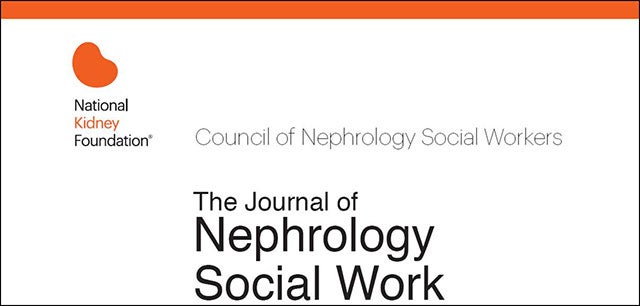The Journal Of Nephrology Social Work - Volume 42, Issue 2 (2018)

Table of Contents
Suicidality Screening by Nephrology Social Workers: A Pilot Study
Dodie M. Stein, Home Dialysis of Indianapolis, Indianapolis, IN; Brooke E. Chehoski, University of South Carolina, Columbia, SC
Current literature demonstrates that suicidality is more prevalent among people with end-stage renal disease (ESRD) than the general population; however, is not known how often patients with ESRD are screened for suicidality. This study examined suicidality screening practices among nephrology social workers using an online survey. Data suggest that about 71% of clinicians screen for suicidality across practice settings: 66% use the Patient Health Questionnaire-9 (PHQ-9); 40% use informal questioning techniques. Though this study found suicide risk to be relatively low among patients with ESRD (<10%), good clinical practice necessitates suicidality screening when conversation with a patient indicates depression or risk of self-harm. A standardized suicidality tool is recommended. Further study on suicidality with patients with ESRD is important for improving clinical care.
Journal of Nephrology Social Work. 42(2):9-16. © 2018 National Kidney Foundation, Inc. This is an open access article under the CC BY-NC-ND license http://creativecommons.org/licenses/by-nc-nd/4.0/.
Beyond Numbers: The Liminal Experience of Kidney Transplantation Amongst Young Adults Following Transfer of Care
Stephanie Bogue Kerr, MA, MSW; Marguerite Soulière, PhD, University of Ottawa, Ottawa, Canada; Lorraine E. Bell, MD, FRCPC, McGill University, Montreal, Canada
Young adults who receive kidney transplants have unique needs. Adherence with medical therapy and with appointments can be a major challenge for this population, as is the transfer from pediatric to adult care. There is little qualitative research that tackles the experience of transplantation amongst young people, and still less from a social work standpoint. The present article reflects the findings of a qualitative, phenomenological study into the transition experience of young-adult kidney transplant recipients. The study found that for these young people, health professionals were involved in their relationship to their bodies. A major theme that emerged was the relational nature of the transfer of care. Finally, the article closes with a discussion of the micro- and macro-level factors that shape these relationships and the implications of these findings for nephrology social workers and other health professionals practicing in adult care settings.
Journal of Nephrology Social Work. 42(2):17-26. © 2018 National Kidney Foundation, Inc. This is an open access article under the CC BY-NC-ND license http://creativecommons.org/licenses/by-nc-nd/4.0/.
Developing Quality Social Work Field Placements in Dialysis Clinics
Dori Muench, MSW, LCSW, NSW-C, Wake Forest Baptist Medical Center, Winston Salem, NC; Melissa C. Reitmeier, PhD, LMSW, MSW, University of South Carolina College of Social Work, Columbia, SC
Dialysis clinics provide rich field placement settings for social work students. In this article, field placements for advanced practice MSW students are carefully examined, as they are best suited to work with patients on a higher clinical level. This article also provides an outline of how advanced practice competencies can be applied in such settings with attention to supervision and the role of the field instructor.
Journal of Nephrology Social Work. 42(2):27-34. © 2017 National Kidney Foundation, Inc. This is an open access article under the CC BY-NC-ND license http://creativecommons.org/licenses/by-nc-nd/4.0/.
Perspectives of Renal Healthcare Professionals about Deceased Organ Donation
Ann M. Andrews, MPH; Caitlin Loughery, MPH, National Kidney Foundation of Michigan, Ann Arbor, MI; Nanhua Zhang, PhD, Division of Biostatistics & Epidemiology, Cincinnati Children’s Hospital Medical Center, University of Cincinnati College of Medicine, Cincinnati, OH; Allyce Haney Smith, MSW; Holly Jenkins Riley, MSW; Caitlin Loughery, MPH, National Kidney Foundation of Michigan, Ann Arbor, MI; Sheri Stav, MSW, Greenfield Health Systems, Bingham Farms, MI; ;Ken Resnicow, PhD, Department of Health Behavior & Health Education, University of Michigan School of Public Health, Ann Arbor, MI; Remonia Chapman, BS, Minority Organ and Tissue Transplant Education Program, Gift of Life Michigan, Ann Arbor, MI; Jerry Yee, MD, Division of Nephrology and Hypertension, Henry Ford Hospital, Detroit, MI and Greenfield Health Systems, Bingham Farms, MI
Little is known about the attitudes of renal healthcare professionals (HCPs) toward deceased donation. We surveyed 222 renal HCPs from 12 dialysis units in southeast Michigan about their attitudes toward organ donation as part of a clusterrandomized, intervention study. Factor analysis identified three subscales: general benefits (alpha .88), general barriers (alpha .80), and staff dialysis barriers (alpha .79). We compared subscale values with two variables: enrollment status in the state donor registry (DR) and intentions for future DR enrollment. Higher scores on all three scales were positively associated with DR enrollment. Mean scores varied by HCP role within the dialysis unit. Tailoring donation education to a role and focusing on the benefits may have an effective impact on HCP attitudes. Results from this study can inform future interventions to improve promotion of organ donation amongst professionals working in dialysis units.
Journal of Nephrology Social Work. 42(2):25-46. © 2017 National Kidney Foundation, Inc. This is an open access article under the CC BY-NC-ND license http://creativecommons.org/licenses/by-nc-nd/4.0/.
Download